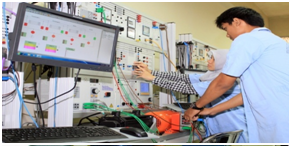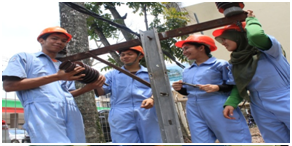Introduction
Electrical Engineering Study Program prepares students to be reliable professionals that are responsive to the technology development, able to apply technology and competence in the field of Electrical Engineering.
Vision
Toward a leading vocational education study program in the field of electrical engineering nationally and internationally.
Mission
- Producing graduates that meet market demand;
- Developing and disseminating applied research in the field of electrical engineering;
- Utilizing electrical technology for empowering local potential and contribute to solve community problems.
Purposes
- To prepare students to be professional mid-level managers that have good competence in the field of electrical engineering;
- To apply, develop and disseminate science and technology in electrical field for improving society living standard;
- To enhance the role of electrical engineering study program as part of educational institution in developing applied science and technology for supporting national development.
Targets
- Produce human resources who have knowledge and competence in he field of electrical engineering;
- Apply science and technology in the field of electrical engineering to improve the quality of people’s lives;
- Pro vocational education, results of product development, and applied technology in the field of electrical engineering.
Strategies to Achieve Targets
- Educate on the basis of science and technology development;
- Disseminate knowledge and research results by cooperating with various related companies / industries;
- Apply the gained knowledge to the community.
Graduates’ Profile
Students who have successfully completed the education program in Electrical Engineering Program earn Associate Expert (A.Md) title and have capability in the field of electrical engineering.
- Graduates can meet job market assessment standards because after 6(six) semesters of study they have competences in the field of electrical engineering, and are able to use computer for electrical engineering, use instrumentation and electronic system for control and monitor process in industry, communicate in English, become entrepreneurs and leaders;
- Graduates can work as designers, planners, technicians, foreman, supervisors, engineers in the field of electrical engineering and capable of being self-employed and work in almost all sectors of employment;
- Graduates can also continue S1 (Bachelor) degree easily since the curriculum is aligned with Bachelor and D IV curriculum.
Learning Outcomes
- Able to complete electrification works;
- Able to demonstrate performance that meet the existing standard;
- Have good team work and report writing ability;
- Responsible and honest in carrying out work;
- Act and behave in accordance with the norms of Pancasila;
- Able toad just to the development of science and technology.
Graduates’ Competences
Core Competences
- Master theoretical concepts of electricity in general and able to formulate solution for procedural problem;
- Able to design and install electrical installation that fits to the existing standard;
- Able to operate electrical systems and equipment;
- Able to estimate cost and specifications of electrical installation and equipment;
- Able to design and install electrical control systems manually and automatically;
- Able to maintain and repair electrical equipment and systems;
- Able to operate distribution system of electric power.
Supporting Competences
- Able to use computer for of electric power distribution system;
- Able to use instrumentation;
- Able to evaluate/monitor the condition of the process control system;
- Able to communicate in English;
- Able to be entrepreneur and manage electrical service business.
Other Competences
Able to be a leader in social life.
Joint Classes
- PLN (Persero) Joint class for DIII program
- South Sumatera province Government Joint class for DIII program
Training Service
- Mechanical Operation and Maintenance of Generator <5 MW
- Mechanical maintenance and repair of Distribution Transformer (Fortal)
- Operating cubicles 20 KV
- Lighting installation single phase and three
- Installation for Industry
- Conversion Engineering of Electric power
- Electrical Engineering Instrumentation
- Control Techniques:
Industry (PLC), process - Power Electronics
- Protection System
Production and Consultation Services
Competency Test Services in which teaching staff involved as members
– Assessor in IATKI
– Assessors in APEI Association
– Assessor in Hakit Association
Facilities
- Fully air-conditioned Classrooms
- Classrooms with LCD
- Seminar Room
- Electrical Engineering Laboratory
- Computer Laboratory
- Electrical Engineering Workshop
- Library
- Internet, Wi-Fi
- Toilet
- A cooperative (economic enterprise)
- Student Association Room


